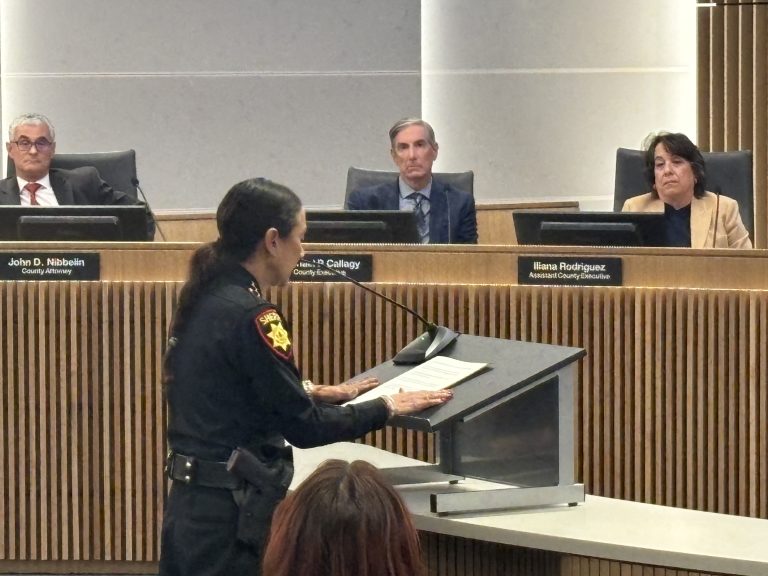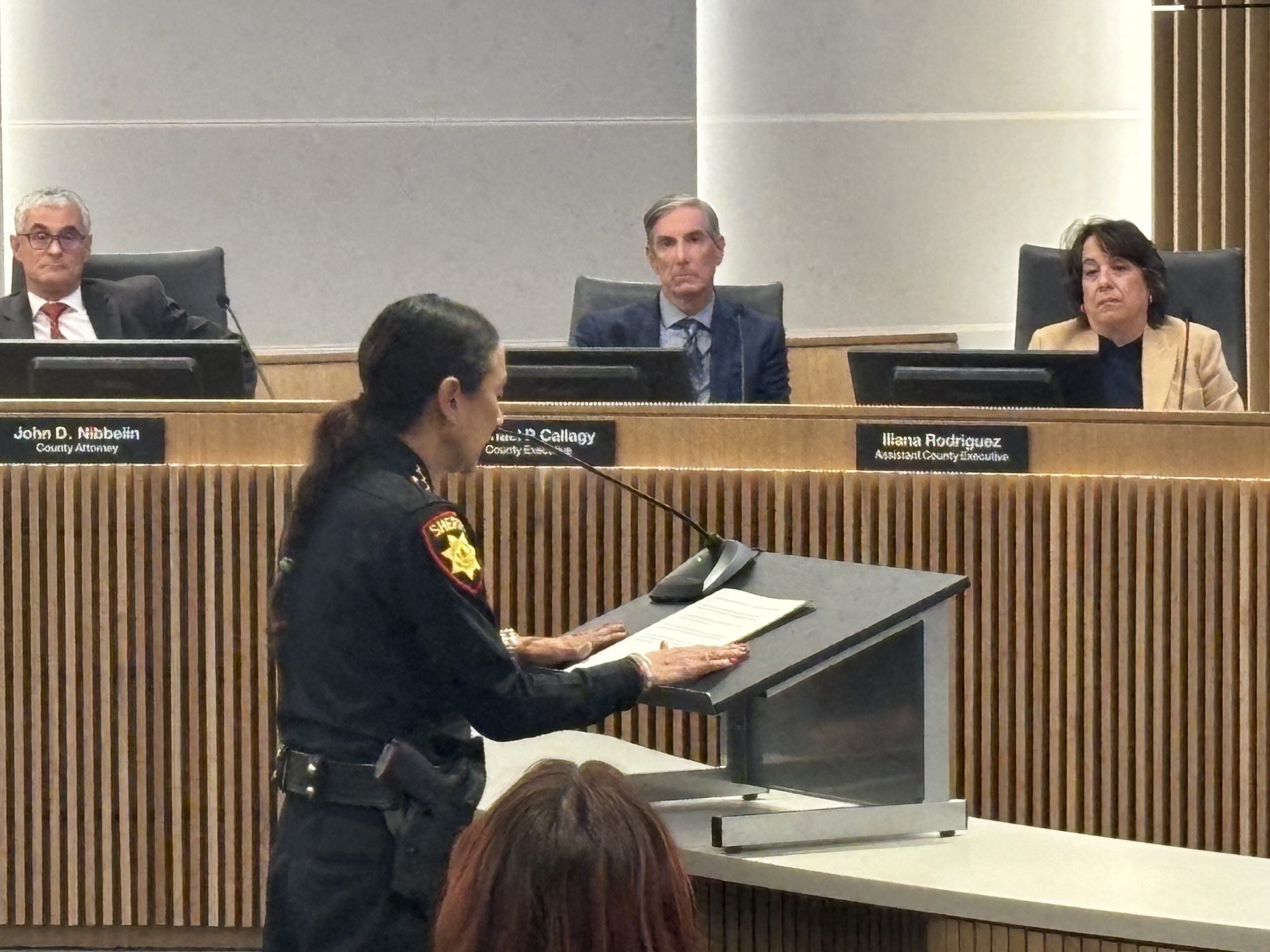En un informe previo a las elecciones ecuatorianas, el jefe de la misión de la OEA, Heraldo Muñoz, señaló varios de los abusos que el gobierno del presidente Daniel Noboa cometía contra la oposición para favorecer su propia candidatura, y declaró: “Frente a este escenario, la misión considera indispensable que se adopten medidas concretas para que las situaciones observadas no vuelvan a repetirse”.
Las medidas no se adoptaron. Los abusos continuaron. Pero después, Muñoz validó la elección. ¿Qué significa para él la palabra “indispensable”?
Este texto fue publicado originalmente en inglés, el 16 de abril, por la Mexican Press Agency. Con autorización de la misma y a solicitud de la comunidad de Mundo Abierto, presentamos la traducción al castellano.
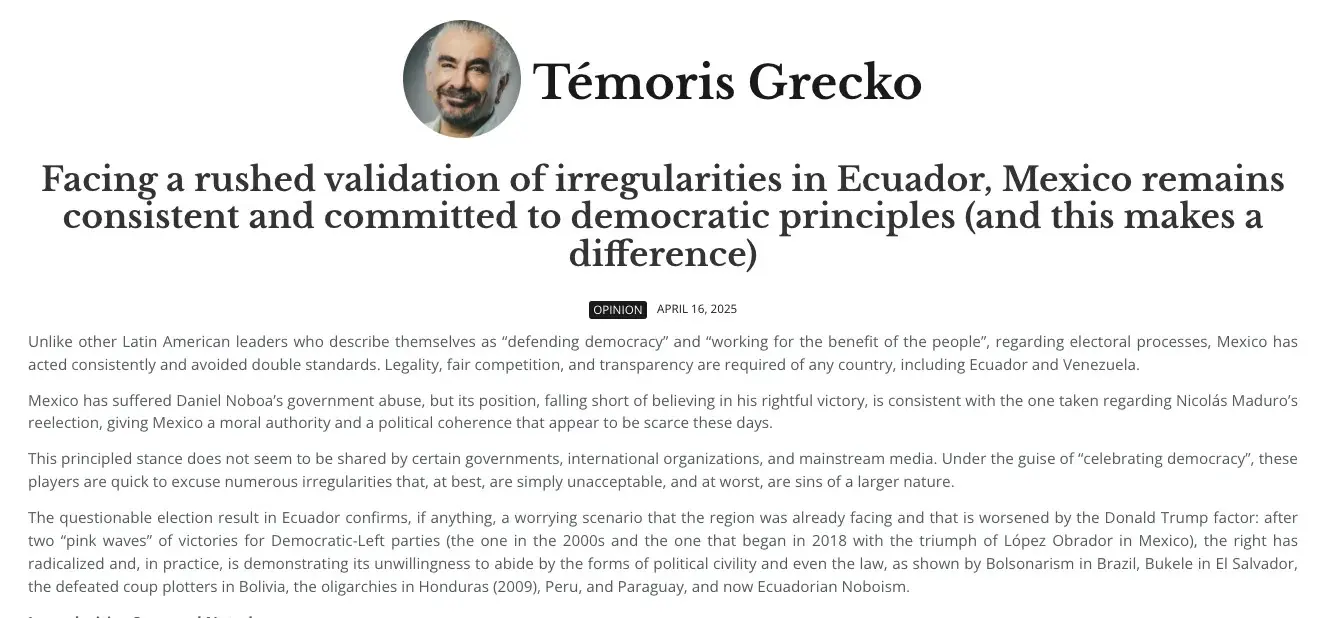
A diferencia de otros líderes latinoamericanos que se autoadscriben en las izquierdas o en las derechas, México ha actuado con coherencia y ha evitado la doble moral. La legalidad, la competencia justa y la transparencia son exigibles a cualquier país, incluidos Ecuador y Venezuela.
México ha sufrido el abuso del gobierno de Daniel Noboa, pero su posición, lejos de creer en una victoria justa, es congruente con la adoptada respecto de la reelección de Nicolás Maduro, dándole a México una autoridad moral y una coherencia política que hoy parecen escasas.
Esta postura principista no parece ser compartida por ciertos gobiernos, organizaciones internacionales y medios de comunicación corporativos. Con el pretexto de “celebrar la democracia”, estos actores se apresuran a excusar numerosas irregularidades que, en el mejor de los casos, son simplemente inaceptables y, en el peor, constituyen pecados de mayor envergadura.
El cuestionable resultado electoral en Ecuador confirma, si acaso, un escenario preocupante que la región ya venía afrontando y que se agrava con el factor Donald Trump: tras dos “olas rosas” de victorias de partidos de izquierda democrática (la de los años 2000 y la iniciada en 2018 con el triunfo de López Obrador en México), la derecha se ha radicalizado y, en la práctica, demuestra su falta de voluntad para acatar las formas de civilidad política e incluso la ley, como lo demuestran el bolsonarismo en Brasil, Bukele en El Salvador, los golpistas derrotados en Bolivia, las oligarquías en Honduras (2009), Perú y Paraguay, y ahora el noboísmo ecuatoriano.
Irregularidades observadas y notadas
El propio Trump tomó la iniciativa al cuestionar los procedimientos democráticos de su país cuando no lo favorecen, hasta el punto de declarar un fraude inexistente en 2020, intentar un golpe de Estado en 2021 y descartar preventivamente un posible resultado adverso en 2024.
Pero las organizaciones internacionales tampoco ayudan. Es difícil esperar mucho de una Organización de Estados Americanos (OEA) que allanó el camino para el golpe de Estado en Bolivia en 2019, y de una Unión Europea (UE) que apoya y consiente el genocidio en Gaza y cuyos principales miembros se niegan a cumplir el mandato de la Corte Penal Internacional de arrestar al primer ministro israelí, Benjamín Netanyahu.
La campaña de la candidata opositora de izquierda, quien según las encuestas estaba técnicamente empatada con Noboa, pero a quien los resultados oficiales situaron 11 puntos por detrás, denunció que “miles de votos para Luisa González desaparecieron injustificadamente durante el recuento, mientras que Daniel Noboa registró aumentos estadísticamente imposibles en numerosos colegios electorales”. Asimismo, negaron que “decenas de actas oficiales, sin firma y sin validez legal, certificaran exclusivamente resultados favorables a Daniel Noboa” y que se intimidara a la población para disuadirla de votar declarando el estado de emergencia exclusivamente en provincias afines a González, entre otras irregularidades también denunciadas por las misiones extranjeras.
Porque no son ciegas, dichas misiones. Señalaron que el presidente Daniel Noboa incumplió su obligación constitucional de solicitar una licencia y dejar a su vicepresidente al frente del gobierno para que hiciera campaña por su reelección. También indicaron el abuso de poder estatal a su favor y criticaron la decisión de celebrar las elecciones en medio del estado de emergencia.
En un informe previo a las elecciones del domingo, la OEA “observó con preocupación que el proceso electoral estuvo marcado por condiciones desiguales durante la campaña”, que hubo “mal uso de recursos públicos y del aparato estatal con fines proselitistas” y que “existió incertidumbre por la falta de pronunciamientos claros y oportunos” del Consejo Nacional Electoral y del Tribunal Contencioso Electoral.
Por su parte, la UE constató que la independencia y neutralidad del Consejo Electoral “fueron nuevamente cuestionadas, tanto por los partidos políticos como por las organizaciones de la sociedad civil”, y señaló que la decisión de prohibir “el uso de dispositivos electrónicos durante la votación” llevó a que el Consejo “fuera acusado de ceder a la presión gubernamental”.

El Partido Popular español se activa por Noboa
Sin embargo, estas señales de alerta no fueron suficientes para ellos. El jefe de la misión de la OEA, el chileno Heraldo Muñoz, sostuvo que nada de esto justifica cuestionar la legitimidad del proceso.
Gabriel Mato, jefe del grupo de la UE, si bien reconoció que la maquinaria estatal se movilizó a favor de Noboa, afirmó que se trataba de un asunto menor: “¿Puede este desequilibrio justificar que se cuestione el resultado electoral? Desde mi punto de vista, es un no rotundo”.
La Unión Europea envió a observar y evaluar las elecciones ecuatorianas no a un diplomático imparcial sino a un miembro del Parlamento Europeo del Partido Popular español, que, con su aliado Vox, ha mantenido el activismo en América Latina para contrarrestar la “ola rosa” y empoderar a partidos de derecha y ultraderecha, como el de Noboa.
No es de extrañar, entonces, que este europarlamentario del PP, Gabriel Mato, pasara directamente de defender el resultado a atacar a los críticos, expresando su repudio a “esos individuos malintencionados que han invertido grandes esfuerzos en generar incertidumbre entre la población, desconfianza en las instituciones electorales y una narrativa de fraude masivo y sistemático, que rechazamos de plano”.

Principio ante la incoherencia
La extrema derecha “hispanoamericana” o “iberosfera”, como le gusta presentarse, ha perdido a un campeador muy influyente : Mario Vargas Llosa, el Premio Nobel de Literatura nacido en Perú pero nacionalizado español, quien falleció el domingo.
Obviamente, no depondrán las armas por esto. Las decisiones políticas de las fuerzas democráticas, progresistas y de izquierda deben considerar que el enemigo al que se enfrentan se parece cada vez más al de los años 60 y 70 —el auge de las dictaduras— que al de los 90, cuando se creyó vencedor definitivo de la batalla mundial, proclamó «el fin de la historia» y se dio el lujo de permitir ciertos avances en las luchas populares.
Para enfrentar los desafíos de la derecha autoritaria, cuya voluntad de poder también implica recurrir a todos los medios legales, paralegales o ilegales para contener el cambio social y político y subyugar la voluntad de las mayorías, la postura principista de la presidenta mexicana Claudia Sheinbaum en los diversos procesos electorales no sólo le otorga autoridad moral sino que gana coherencia y solidez para la izquierda democrática y pone en evidencia la amenazadora hipocresía de las derechas.
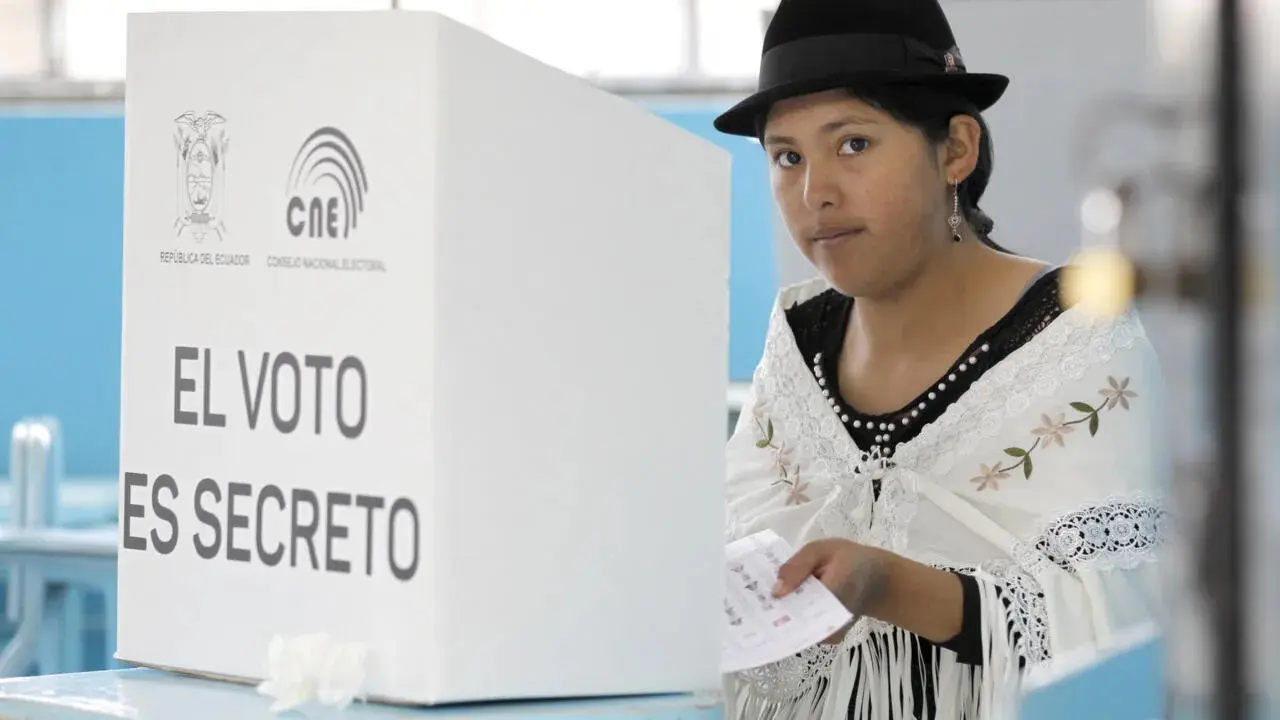
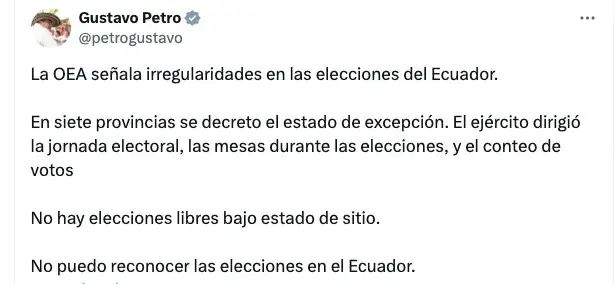
More from the author: Trump has an expiration date. The long-term threat is Musk (and he comes with 425 billion… and with X)


















